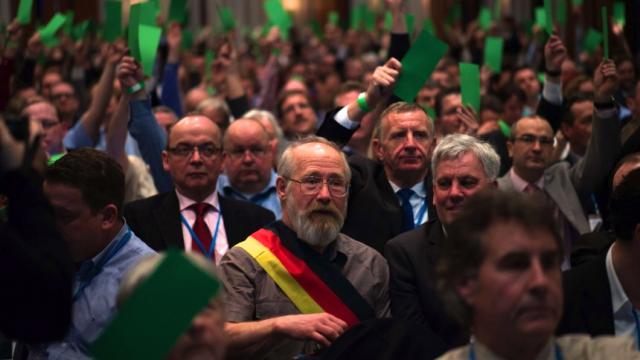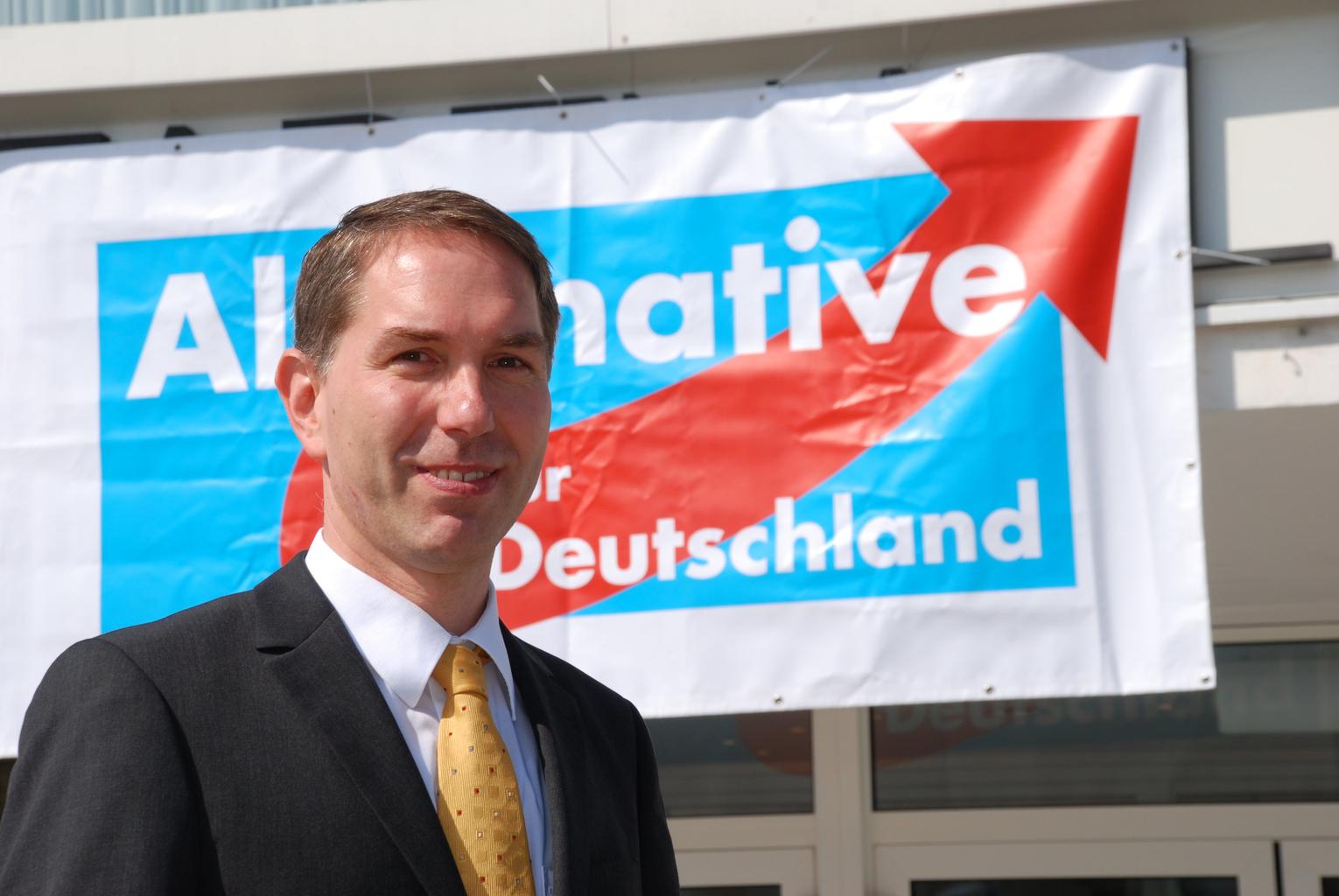
BERLIN — On a recent sunny day, a motley crew of protestors here held a rally for immigrant voting rights in front of the German parliament. Elsewhere in Berlin, the satirical political party Die Partei papered over election posters of a 74-year-old candidate with a mock headshot of an even more geriatric politician. On TV, the party Die Violetten (the Purples) ran campaign ads of sunflowers, trampolines and children doing yoga. Their message in soft tones: the time for “spiritual politics” has arrived.
Fringe movements and alternative parties provide texture for democracy. Germany is no exception.
This year, however, after Germans vote in national elections on Sunday, September 22, the far right is set to wield the most influence among groups outside the country’s political mainstream. The Alternative for Deutschland (AfD), a conservative Eurosceptic party, is set to play an especially outsized role in German politics.
Polls show the incumbent Chancellor Angela Merkel’s Christian Democratic Union (CDU) is likely to stay in power after the elections. But the same polls also show that the makeup of her governing coalition is up in the air — and that the AfD might play a decisive role in how she proceeds.
The AfD could receive four percent of the German vote, attracting enough support from conservatives that it eats into the majority assembled by the reigning conservative coalition: the CDU and the center-right Free Democratic Party. If that happens, Merkel will likely need to assemble a grand coalition between her conservatives and their traditional rivals, the center-left Social Democratic Party.
And if the AfD receives more than five percent — a possibility, given polling trends — it would receive seats in parliament and potentially cast decisive votes in a closely split chamber, a stunning success that would embolden a political party not yet six months old.
Much of AfD’s success stems from its leaders exploiting Euroskepticism among Germans who feel their wealthy, productive country is unfairly shouldering the burden of economic growth in the EU while others accumulate debt and resist reform. The AfD believes Germans should regain their national pride and stop identifying themselves so much as Europeans.
“Europe is Germany’s escape from itself,” said AfD co-founder Alexander Gauland during a speech in Glienicke-Nordbahn, a well-heeled residential area in the northern outskirts of Berlin. “Germany has a moral guilt complex from the war, and moral guilt somehow has to be paid for.”
Outside, Mercedes-Benzes and BMWs dotted the parking lot of the town hall where Gauland was speaking. Their owners included the established right, technocrats, executives, businessmen and academics. Most want a serious rejig of Euro bailout policies and, ultimately, a rethink of the Eurozone itself, including forcing out weaker members.
“Better a horrible end, then unending horror,” said Gauland to applause.
Whether AfD will sit in parliament remains to be seen. Like other single-issue parties, they struggle with mainstreaming their message.
“Would it really matter if all the Eurozone countries all ended up bankrupt? Then we could just waive all debts and start again,” an audience member called out to Gauland.
“It’s not that simple,” he answered, illustrating the difficulty of trying to reach the common voter while running on a platform as complex as reforming the Eurozone. It turns out the electorate’s perfect understanding of the issues isn’t required, however.
“The average German voter knows very little about these issues, but understands something is wrong in that they feel they are being forced to pay for others,” said Andreas Beckmann, a political analyst at the Berlin-based consultancy Bohnen-Kallmorgen & Partner.
The runner-ups in the jockeying between alternative parties this year are the left-wing Pirates. One would think the Pirates’ platform of data protection and security would appeal to voters in a country where citizens still remember the surveillance of their socialist past. But the Pirates haven’t managed to leverage that history into political relevance.
Polls show the Pirates won’t pass the five percent threshold to win seats in parliament, even though information leaked by Edward Snowden revealed German involvement in the U.S. National Security Agency’s eavesdropping on international telecommunications. The German public has been largely quiescent on the issue.
“The Snowden/NSA spy scandal moved the political discussion only minimally,” admitted Pirates spokesperson Anita Möllering. “It's not really a voters’ issue. It really isn't that relevant for so many people.”
Of course, the Pirates could have made it relevant. Last year, the ragtag band of internet activists evolved into an established party, with a series of successes in regional elections that earned them favorable media attention and seats in four state parliaments.
After their taste of success, however, they fumbled on the transition from activists to savvy politicians. Stalled policymaking and infighting kept the party from securing real influence in German politics.
Möllering said the party is learning.
“Politically, we have developed ourselves very well,” she said. “We have learned that it just doesn't just depend on having positions or demands, but to fight to be able to implement them, to build majorities.”
The Pirates have a lot to prove. The party might have won 15 percent of the German vote if the elections had been held a year ago, said Carsten Koschmieder, a political analyst at the Freie Universität Berlin. This year, though, it’s unthinkable. The party failed to capitalize on its momentum.
“I don’t think they will get any more than the two to three percent they have now,” he said.
Some alternative parties are, thankfully to most, having other troubles. At the right edge of the fringe, the neo-Nazi National Democratic Party (NPD) has been largely barred from campaigning as it battles in the country’s highest courts over state funding.
NPD spokesperson Stefan Lux blames those woes for his party’s “streaky” chances on Sunday. Still, Lux said, the party had sufficient funding to plaster anti-immigrant posters and signs criticizing asylum seekers across Berlin. He claimed plenty of Germans would support the party if it could transmit its message to the broader public.
“Fear of discrimination” prevents NPD voters from honestly expressing their views in public, he said. “Many of them believe voting behavior can be secretly filmed. The NSA scandal has made that even worse. They believe they can then be caught and persecuted.”
Analysts agree the NPD’s chances of getting into parliament are virtually non-existent.
“The NPD is in shambles,” said Beckmann.
Ironically, however, because of the EU crisis, hope springs eternal for political parties even like the NPD. “We will try to get at least one person in the European parliament,” Lux vowed.
The Pirates’ Möllering was optimistic about the European parliamentary elections scheduled for next year; win or lose in Germany, she said, the party is already planning for them. “It’s somehow always campaign season,” she said.
3 WAYS TO SHOW YOUR SUPPORT
- Log in to post comments













